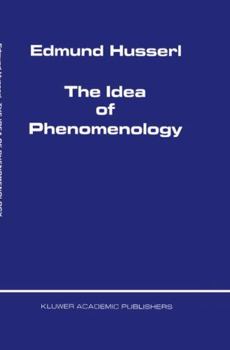The Idea of Phenomenology
Select Format
Select Condition 
Book Overview
In this fresh translation of five lectures delivered in 1907 at the University of G ttingen, Edmund Husserl lays out the philosophical problem of knowledge, indicates the requirements for its solution, and for the first time introduces the phenomenological method of reduction. For those interested in the genesis and development of Husserl's phenomenology, this text affords a unique glimpse into the epistemological motivation of his work, his concept of intentionality, and the formation of central phenomenological concepts that will later go by the names of transcendental consciousness', the noema', and the like. As a teaching text, The Idea of Phenomenology is ideal: it is brief, it is unencumbered by the technical terminology of Husserl's later work, it bears a clear connection to the problem of knowledge as formulated in the Cartesian tradition, and it is accompanied by a translator's introduction that clearly spells out the structure, argument, and movement of the text.
Format:Hardcover
Language:English
ISBN:0792356918
ISBN13:9780792356912
Release Date:April 1999
Publisher:Springer
Length:72 Pages
Weight:0.70 lbs.
Dimensions:0.6" x 6.4" x 9.4"
Customer Reviews
1 rating
A Bit Pricey but Good
Published by Thriftbooks.com User , 14 years ago
The Idea of Phenomenology is Volume VIII of the recent Husserl's Collected Works Series published by Kluwer. This small text consists of five short lectures (and some immediate post-lecture reflections) given by Husserl in 1907. These lectures represent the first public exposition of his phenomenology and are reminiscent of Descartes' Meditations - in that Husserl grapples with the question of knowledge. Lee Hardy's new English translation is generally clear and readable. Although probably for a limited readership, I recommend it for fans of Husserl and readers interested in the origins of phenomenology.






